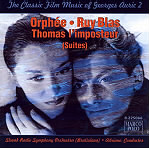There’s a certain sameness to Georges Auric’s music for these films, despite his use of interesting instruments such as saxophones, celeste, and Ondes Martinot. From a purely melodic point of view, he’s clearly not as gifted as any number of great Hollywood composers, nor do his orchestrations shimmer with anything like the same sense of fantasy shown even by colleagues such as Honegger. On the plus side, he tends to write cues in closed forms, meaning that they have a beginning, a middle, and an end, and so work well away from the films themselves. The most interesting piece here is the brief suite from Thomas l’imposteur, though it’s hard to say precisely why: the atmosphere of each cue seems more sharply defined, the melodies more distinctive. Ruy Blas, on the other hand, reveals the composer to be a bit too cynical to fully enter into the swashbuckling world of the film. It may be that the reasons for this were partly financial; the post-War French cinema simply could not afford the sumptuous studio orchestras that let Hollywood composers explore the outer limits of musical fantasy. In any event, Adriano’s performances certainly present this music in the most positive light, and anyone curious about these scores need not hesitate. I just wish I could be more enthusiastic about the music itself.
































